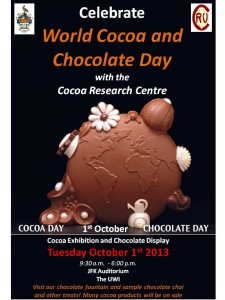 The previous post about the International Treaty on ITPGRFA allows me to segue seamlessly to today’s World Cocoa and Chocolate Day event at the University of the West Indies in Trinidad. Seamlessly, I hear you ask? Stretching a point, surely. Well, no, because everyone knows that the International Cocoa Genebank, maintained at said institution’s Cocoa Research Centre, is one of the collections which are available in the Multilateral System of the Treaty under its Article 15. You can tour the place, you know. Anyway, I’m hoping one of my inside people will come through with some photos of the celebrations. Stay tuned.
The previous post about the International Treaty on ITPGRFA allows me to segue seamlessly to today’s World Cocoa and Chocolate Day event at the University of the West Indies in Trinidad. Seamlessly, I hear you ask? Stretching a point, surely. Well, no, because everyone knows that the International Cocoa Genebank, maintained at said institution’s Cocoa Research Centre, is one of the collections which are available in the Multilateral System of the Treaty under its Article 15. You can tour the place, you know. Anyway, I’m hoping one of my inside people will come through with some photos of the celebrations. Stay tuned.
Nibbles: Coca, Rice breeding, Artisanal cheese, Win win, Microbes, Potato dyes, Beans, Agroforestry & conservation, Sweet potato marketing
- Bolivia ramps up coca production. Sniff.
- Tamil Nadu ramps up rice breeding.
- Bulgaria ramps up artisanal cheese production.
- Collaboration between organic and biotech ramped up. In other news, pigs fly.
- Ramp up use of microbes, microbiologist says. Nobody surprised.
- Americans ramp up production of purple potatoes.
- Everyone ramps up bean production. To save the planet, no less.
- Can agroforestry be used to ramp up tree conservation? Well, maybe?
- Need to ramp up sweet potato marketing.
Nibbles: Weeds, Poverty, Mycorrhizae, Gluten-free wheat, Vanilla, Different apples, Pashmina wool
- Oh dear, someone else has fallen for the “weeds are better for you” line, cautious question-mark notwithstanding.
- And guess what? The poor don’t buy nutritious foods. How silly of them.
- Great post explaining the great unseen: mycorrhizal fungi as drivers of plant diversity.
- Gluten-free wheat? Really (even if the links still don’t work).
- What would you video on honeymoon in Mexico? A visit to a vanilla plantation. What else?
- Conserving apples and earth apples at opposite ends of the world.
- Oh, no, pashmina’s in trouble!
Nibbles: Landscapes pod, Tartiness evolution, Diversity pix, Eve Crowley vid, Commons debate, Subsidies, Arabidopsis database, Beard beer, Kew herbarium vid, Minoan pests, FDish seeds, Extinction is forever
- CIFOR scientist talks about the much-vaunted landscape approach.
- The repeated evolution of lemony flavour.
- Nice infographic of breadfruit diversity in the Pacific.
- Better infographic of chili pepper diversity in Mexico. Both are on Facebook. Hope you guys can see them.
- FAO’s Eve Crowley is didactic and inspirational by turns about women, co-operatives and rural development.
- Hardin vs Ostrom. Walk-over.
- How much does production have to increase, really? Lobell deals the cards.
- What are the effects of input subsidies on maize prices in Malawi and Zambia? Small to none.
- Plant database to charge for access? Never a good idea.
- Ok, here’s a first, a beer I don’t altogether feel like tasting.
- Last days of the soybean homecoming show in Hong Kong. Anybody out there seen it?
- Video on the intricacies of Kew. Not as long as you’d think.
- Weevils in sweet pea jar pinpoint season of Santorini eruption. Has anyone tried to recover DNA from the seeds?
- Experts for ensuring quality fish seeds to enhance production. Say what?
- How should we mark the extinction of the passenger pigeon next year?
One more cup of coffee
For some reason, there’s been a sackful of coffee stories lately. Here’s a quick summary:
“Pistols for two, and coffee for one.”
“[Coffee] is of excellent Use in the time of Pestilence, and contributes greatly to prevent the spreading of Infection.”
“We just had to try at least a cup in every village we stopped at, and as they were small cups, sometimes more than one… The irony is that I am a ‘tea-only girl’.”
“Yes, Starbucks has announced it’s taking up shop in Bogota, Colombia. It says it wants to celebrate Colombian coffee.”
“Here, we do not work hard for survival, but we work hard to live a better life; that is what I’ve learned from working on this plantation.”
“In order to create these pre-breeding populations with enough genetic diversity for these economically important traits, WCR 1 will utilize genetic material from the current germplasm collections as well as new material coming from wild populations from the WCR GERMPLASM Project.”